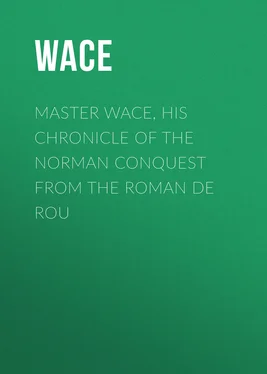Wace - Master Wace, His Chronicle of the Norman Conquest From the Roman De Rou
Здесь есть возможность читать онлайн «Wace - Master Wace, His Chronicle of the Norman Conquest From the Roman De Rou» — ознакомительный отрывок электронной книги совершенно бесплатно, а после прочтения отрывка купить полную версию. В некоторых случаях можно слушать аудио, скачать через торрент в формате fb2 и присутствует краткое содержание. Жанр: foreign_prose, История, foreign_edu, foreign_antique, на английском языке. Описание произведения, (предисловие) а так же отзывы посетителей доступны на портале библиотеки ЛибКат.
- Название:Master Wace, His Chronicle of the Norman Conquest From the Roman De Rou
- Автор:
- Жанр:
- Год:неизвестен
- ISBN:нет данных
- Рейтинг книги:4 / 5. Голосов: 1
-
Избранное:Добавить в избранное
- Отзывы:
-
Ваша оценка:
- 80
- 1
- 2
- 3
- 4
- 5
Master Wace, His Chronicle of the Norman Conquest From the Roman De Rou: краткое содержание, описание и аннотация
Предлагаем к чтению аннотацию, описание, краткое содержание или предисловие (зависит от того, что написал сам автор книги «Master Wace, His Chronicle of the Norman Conquest From the Roman De Rou»). Если вы не нашли необходимую информацию о книге — напишите в комментариях, мы постараемся отыскать её.
Master Wace, His Chronicle of the Norman Conquest From the Roman De Rou — читать онлайн ознакомительный отрывок
Ниже представлен текст книги, разбитый по страницам. Система сохранения места последней прочитанной страницы, позволяет с удобством читать онлайн бесплатно книгу «Master Wace, His Chronicle of the Norman Conquest From the Roman De Rou», без необходимости каждый раз заново искать на чём Вы остановились. Поставьте закладку, и сможете в любой момент перейти на страницу, на которой закончили чтение.
Интервал:
Закладка:
Master Wace
Master Wace, His Chronicle of the Norman Conquest From the Roman De Rou
INTRODUCTION
A detailed narrative of events so interesting as those which preceded and attended the conquest of England by William, duke of Normandy, needs little apology for its introduction, for the first time, to the english reader. If his feelings are at all in unison with those of the translator, he will welcome the easy access thus afforded to this remarkable chronicle;—by far the most minute, graphic, and animated account of the transactions in question, written by one who lived among the immediate children of the principal actors. The historian will find some value in such a memorial of this great epoch in english affairs;—the genealogist will meet in it some interesting materials applicable to his peculiar pursuits;—and the general reader will hardly fail to take a lively interest in such an illustration of the history of the singular men, who emerged in so short a time from the condition of roving barbarians into that of the conquerors, en noblers, and munificent adorners of every land in which they settled, and to whom the proudest families of succeeding ages have been eager to trace the honours of their pedigree.
MASTER WACE, the author of the ROMAN DE ROU and chronicle of the dukes of Normandy, from which the ensuing pages are extracted, tells concerning himself, in his prologue, all that is known with any degree of certainty. His name, with several variations of orthography, is not an unusual one in early norman history, though he has not claimed an identification with any known family distinguished by it. The name of Robert, which has been usually assigned to him as an addition, has no sufficient warranty. It certainly occurs in connection with that of Wace in the charters of the abbey of Plessis-Grimoult; (see the Mémoires des antiquaires de Norm, viii.); but Richard Wace, a priest whose name occurs in the chartulary of the abbey of St. Sauveur le Vicomte, has been speculated upon by the Abbé de la Rue as having a more probable claim of identification.
In speaking of the numbers which composed William's invading fleet, Wace says,
—jo oï dire a mon pere,
Bien m'en sovint, mais varlet ere;
and it has been in consequence supposed that he intended to represent his father as a cotemporary and even an eye witness of the expedition. It will, however, be easily seen that this is extremely improbable. Wace lived and wrote as late as at least 1173, and could hardly have been born earlier than the commencement of the eleventh century. The assumption that his father was adult in 1066 would give to the latter an improbable age at his son's birth, and a very great one at the time when the 'varlet' could have listened to the tale of his parent's experience. The probability, therefore, is, that Wace only meant to refer to his father as a suitable authority, conveying information which he might easily have derived from living among those who actually shared in the expedition. It is clear, however, that in another place, p. 115, he directly asserts his own communication with persons adult at the conquest; for, in speaking of the comet that preceded it, he refers to the report of eye-witnesses as his personal authority:
Asez vi homes ki la virent,
Ki ainz e poiz lunges veskirent.
Master Wace tells us that he was born in Jersey;—probably soon after 1100. He was taken young to be educated at Caen, and proceeded thence to the proper dominions of the king of France; returning eventually to Caen, where he betook himself to writing 'romanz.' He says that he finished his 'Roman de Brut' (now in course of publication at Rouen) in 1155; and that he lived under three Henries; namely Henry I. and II. of England, and the latter's son Henry, who died young. His principal patron was Henry II. who gave him a prebend of the cathedral of Bayeux. It appears, we are told, from the archives of that church, that he held the office nineteen years. We learn from him, however, that he did not consider his reward equal to his desert; and he dwells on further promises, which would have been more acceptable if followed by performance.
His chronicle (which he says he wrote in 1160) continues down to 1106; and ends in apparent ill humour at Benoit de Sainte-More's being employed upon a similar task. His concluding words are,
Ci faut li livre maistre Wace,
Qu'in velt avant fere—s'in face!
He is reported to have died in England as late as 1184. He certainly wrote after 1173, for his ascending chronicle of the dukes of Normandy speaks of events which occurred in that year.
The earlier portions of his chronicle, like the pages of Ordericus Vitalis, teem with wonders. His principal sources of these materials were Dudo de St. Quintin, and William of Jumieges. But, as M. Guizot observes in vindication of the latter, the reproach is certainly not, that having truth and error within his reach he selected the latter, but that with no choice about the matter he used the only materials that were in his power. When he reached the era of the conqueror, more complete and authentic information was within his reach; and the perusal of this later portion of his work will perhaps leave no unfavorable impression as to the judgment and fidelity with which he has used his materials, especially with regard to the narrative of the great english expedition. There is an obvious desire to represent the truth, and to state the doubt when certainty was not attainable; and it may not escape the reader, that though Wace is far from wanting in poetic spirit, he sometimes rejects precisely those ornaments of his story which were most attractive for a poet's purpose, and for the use of which grave example might be pleaded.
He is particularly interesting whenever his subject leads to local description applicable to his more immediate neighbourhood. From that part of Normandy in particular his list of the chiefs present at the battle of Hastings has its principal materials. The allusions, in which he abounds, to the personal history and conduct of many of these leaders give great value to this portion of his chronicle. Anachronisms no doubt are easily to be discovered, from which none of the chroniclers of the day were or could be expected to be exempt. His christian names are sometimes incorrect; an error which he certainly might have avoided had he followed the safer policy of Brompton, who covers his inability to enter upon that branch of his work, by roundly asserting that truth was unattainable.
If Wace is followed on the map, it will readily be seen to what extent the fiefs in his own district of Normandy predominate in his catalogue. He even commemorates the communes of neighbouring towns; and the arrangement throughout is determined by circumstances of propinquity, by rhyme, or other casual association.
But with all the drawbacks which may be claimed, Wace's roll, partial and confined in extent as it is, must always be considered an interesting and valuable document. Even if it be taken as the mere gossip and tradition of the neighbourhood, it belongs to a period so little removed from that of the immediate actors, that it cannot be read with indifference. It bears a character of general probability in the main, of simplicity and of absence of any purpose of deception. It puts together much local and family information, gathered by an intelligent associate of those whose means of knowledge was recent and direct; and it may be read, so far as it goes, with far less distrust, and is in fact supported by more external authority both positive and negative, than those lists which were once of high pretension, but are now universally abandoned as fabricated or corrupt. 1 1 The list in the printed 'Chronique de Normandie,' though very inaccurately given, is based upon Wace's. It may be found much more correctly in the fine MS. Chronicle of Normandy, (which ought to be printed.) in the British Museum, Bibl. Reg. 15 E. vi. fol. ccccx.
Интервал:
Закладка:
Похожие книги на «Master Wace, His Chronicle of the Norman Conquest From the Roman De Rou»
Представляем Вашему вниманию похожие книги на «Master Wace, His Chronicle of the Norman Conquest From the Roman De Rou» списком для выбора. Мы отобрали схожую по названию и смыслу литературу в надежде предоставить читателям больше вариантов отыскать новые, интересные, ещё непрочитанные произведения.
Обсуждение, отзывы о книге «Master Wace, His Chronicle of the Norman Conquest From the Roman De Rou» и просто собственные мнения читателей. Оставьте ваши комментарии, напишите, что Вы думаете о произведении, его смысле или главных героях. Укажите что конкретно понравилось, а что нет, и почему Вы так считаете.












